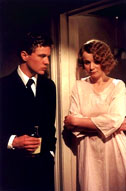
Movie Guru Rating:

Comment
on this review
| |

In Gosford Park, Robert Altman takes on the British class system
by Jesse Fox Mayshark
At first blush, Robert Altman doesn't seem a likely candidate to make a British period piece. Whatever else Altman has been in his 30-plus years as a filmmaker—maverick, visionary, misunderstood, overrated—he's always been resolutely American. His movies have a brash self-assurance, a deliberate vulgarity that puts him in a line of swaggering, male-centered Yankee artists stretching from Walt Whitman to Ernest Hemingway to Howard Hawks.
So it's interesting that for his latest ensemble rondelay, he was attracted to territory usually covered by BBC dramas and little-old-lady whodunnits. Gosford Park draws on several identifiable sources: Like Agatha Christie's mysteries, it isolates a group of characters in a remote setting and then kills one of them off; like Jean Renoir's classic The Rules of the Game, it takes place over a hunting weekend at an aristocratic estate in the years preceding World War II; and like the epic TV series Upstairs, Downstairs, it is as interested in the servants as the masters.
In fact, class tension is really the overriding theme of Gosford Park, and Altman proves an astute observer and commentator. It is possible that nobody but an American could look at the rigid British caste system with such clear eyes. Just as some of the most objective dissections of American racial issues have come from outside perspectives, Altman approaches the Empire-era aristocracy without a trace of sentiment or restraint. The result is a deeply felt indictment that is by turns sophisticated, satirical and savage. Think of it as Upstairs, Downstairs with the gloves off.
Subject matter aside, Gosford Park is every inch an Altman project. There's the huge cast, a bevy of fine British players. There's the lavish, detailed setting; Altman zooms his cameras up and down the mansion's long hallways and staircases the same way he maneuvered through the ramshackle frontier town in McCabe and Mrs. Miller and the Army camp in M*A*S*H. And there are the interconnecting storylines and overlapping dialogue.
The first half-hour of Gosford Park is almost dizzying. It begins with the arrival of an elderly countess (the magnificent Maggie Smith) and her young Scottish maid Mary (Kelly Macdonald) at the titular Park, a sprawling country estate owned by Sir William McCordle (Michael Gambon). From there, the introductions come fast and furious, and you can be forgiven for taking a while to sort out the names and faces. As each of the guests arrives and is greeted above stairs, their valets and lady's maids arrive below stairs, where they are assigned quarters by the efficient Mrs. Wilson (Helen Mirren). To their consternation, they are also assigned new names. "We keep the old ways," Mrs. Wilson explains stiffly, which means the servants are known by their employers' names rather than their own.
Even with 30-some characters in the mix, Altman allows room for several standout performances. And the women steal the show—besides Smith, Macdonald and Mirren, there's Kristin Scott Thomas as Sir Williams' perfectly bitchy wife Sylvia, Claudie Blakley as the mousy Mabel Nesbitt (a woman of such modest means that she travels with neither a maid nor a wardrobe), and especially Emily Watson as the irrepressible head housemaid Elsie. The men are very good as well, but only Clive Owen, as a handsome, secretive valet, can hold his own with the femmes.
Altman indulges the characters' natural cattiness and has a good deal of fun with the ways the various classes and sub-classes react and interact with each other. In private, even the haughty countess will dish dirt with her maid. But in public, the roles prescribed to each person by his or her place in the household must be strictly observed. From the beginning, the film lingers on details that we know must be adding up to something—a missing kitchen knife, unidentified photographs, rows of bottles marked "Poison"—so it's no surprise when one of the principal characters turns up dead.
This opens the door for the film's sole misfire, the appearance of funnyman Stephen Fry as the blustering, doltish Inspector Thompson. But it's not too much of a distraction, because by that point we're more interested in the film's slow unveiling of its various characters' depths and motiviations than in the surface satire. The resolution of the mystery is satisfying on a purely narrative level, but even more so on the rich level of character development and social commentary that marks Altman's best work.
It won't give away anything to say that the victim and the murderer are inextricably bound by the conventions of a social order that gives one set of human beings almost absolute power over another. Unlike other superficially similar films (The Remains of the Day, for example), Gosford Park nurtures no illusions about the nobility of service in the aristocratic system. British servitude may never have approached the brutality and explicit dehumanization of American slavery, but Altman suggests its effects could be just as psychologically devastating. The film's few American characters—tellingly, a movie producer and his companion—are derided by their hosts as vulgar and classless. And that latter word in particular has never seemed like such a compliment.

January 17, 2001 * Vol. 12, No. 3
© 2000 Metro Pulse
|